Demolition Contractors Spring Valley Lake
Find the best Structure Demolition in Spring Valley Lake
Receive 3 FREE Structure Demolition quotes for your project today! Compare profiles, reviews, accreditations, portfolio, etc... and choose the best service.

Coastal Excavation & Construction Inc
51 reviewsPO 585, Goleta, 93116, USMeet Chad Cushman - Founder of Coastal Ex Founded in 2007 by Santa Barbara native and avid waterman, Chad Cushman - Coastal Ex started with a vision as expansive and clear as the California coastline. Just as the coast is a dynamic meeting point of land and sea, Cushman saw an opportunity to bridge creativity and stability in the construction industry. Cushman’s strong compass, guided by a commitment to quality, reflects his unwavering dedication to excellence amidst ever-changing conditions. Each project under his direction embodies his commitment to meticulous craftsmanship and innovative thinking and problem solving in a dynamic industry. Coastal Excavation and Construction continues to stand as a testament to the integrity and enduring quality that define his vision and the essence of the coastal spirit. When he’s not on site with his team, you can find Chad in his workshop welding, tending to his growing orchard or swimming in the Pacific Ocean that he’s grateful to call his backyard. Decades of Results Coastal Excavation & Construction is a highly skilled and licensed general engineering contractor specializing in a wide range of services, from custom design and drawings to demolition, excavation, grading, trenching, pipe installation, backfill, drainage, erosion control, footings, foundations, structural building, light duty building, pool excavation, driveways, hardscapes, septic systems, fire prevention, land clearing, heavy duty landscaping, and hauling. With a commitment to quality and customer satisfaction, Coastal Ex has been serving the Santa Barbara County and Central Coast communities for over 15 years. Their team of experienced professionals is dedicated to providing exceptional service and delivering projects on time and within budget. Whether you're looking to build your dream home, renovate your existing property, or tackle a challenging landscaping project, Coastal Ex has the expertise and resources to make your vision a reality.
- Services
- Why Us?
- Our Team
- Gallery
Get Quote
De Build Group
52 reviews1930 12th Ave, Oakland, 94605, USHigh-Quality Contractor We perform all work in accordance with any applicable building codes and professional industry standards, making your vision come true that's what we do. San Diego & San Fransico Area San Francisco Bay Area De Build Group Inc In the Build Group, our mission is to make your project come true, quality construction that lasts over time, at competitive prices throughout the Bay Area. Our Commitment to Quality 1. Architects And Engineering Work Together. 2. Professional workmanship 3. Using High durability materials High-Quality Workmanship At De Build Group Inc we put our client’s needs first to deliver a project on time at a fair price. We are a construction and remodeling company in Bay and San Diego Area that is focused on building relationships through high-quality products, expert services, and the best customer service in the industry. California License # 1046611B GENERAL BUILDING C-8 - CONCRETE C15 - FLOORING AND FLOOR COVERING C21 - BUILDING MOVING, DEMOLITION A - GENERAL ENGINEERING Free estimates We are Passionate Honest and Dependable Always Improving U.S. Certified Contractors Call Now Speak Live Expert! Home Remodeling, General Contractor, Demolition, & Landscaping New home build Importance of healthcare organizations dictates norms of design. Concrete contractor We Build Sidewalks, driveways patios with all quality requirements Foundation contractor We are a company that offers design and build services on a serious level. Deck contractor Ideal for your frontyard or backyard, red wooden decks are the best for your home Click to check out our Pavers Premium Pavers Blowout Pavers Patios Retain Walls Pool Decks Walkways Synthetic Turf Firepits Landscaping Design Outdoor Kitchens BBQ Islands Decks & Balconies Foundations Basements Framing Outdoor Kitchens Room Extentions Kitchen Remodels Bathroom Remodels Pavers Fences New Homes New Building High-Rises Warehouse Plazas Malls Apartments Buildings Excavations French Drains Gates Pavers Stamped Concrete Demolitions Sidewalks Approaches Curbs Asphalt Driveways Concrete roads Schools Certified Contractors in San Francisco Bay & San Diego Sidewalk & Approach Replacement Curb Cut & Replacement Deck Repair & Replacement Bathroom Remodel Stamped Concrete Driveway Driveway Installation & Replacement Raise Home & Garage Addition Synthetic Grass & Soil Turf Installation. All images are originals taken with permission of owners of properties. De Build Group reserves all rights to all images. Get a Fast Quote Now! Click Here Kitchen Remodeling Retaining Wall Replacement Foundation Repair, New Installation Fense Repair & Installation New Home Construction Paver Installation & Design Basement Repair & Installation Hardscape & Landscaping Click Here to speak to Live Expert! Se Habla Españols Find us on: Best Contractors in San Diego & San Francisco Bay Area San Diego El Cajon Chula Vista Oceanside Coronado Carlsbad Vista San Marcos Encinitas Nacional City San Marcos Escondido Imperial Valley Oakland San Jose Alameda Contra Costa Napa Marin San Fransico San Mateo Santa Clara Solano Sonoma Concord San Ramon Best Reviews In San Francisco Bay & San Diego Area Making Your Vision Come True, Thats What we Do +1500Projects completed 250Workers employed 100% Satisfaction guarantee De BuilD Group We perform all work in accordance with any applicable building codes and professional industry standards. Friendly customer service and precise field management deliver awesome final results. Make Your Vision Come True, That What We Do. Contact US 1930 12 Ave, Oakland CA, 94605 (510) 650-1145 (619) 762-4498 (408) 317-4966 Resources © 2023. All rights reserved by De Build Group
- Services
- Why Us?
- Gallery
Get Quote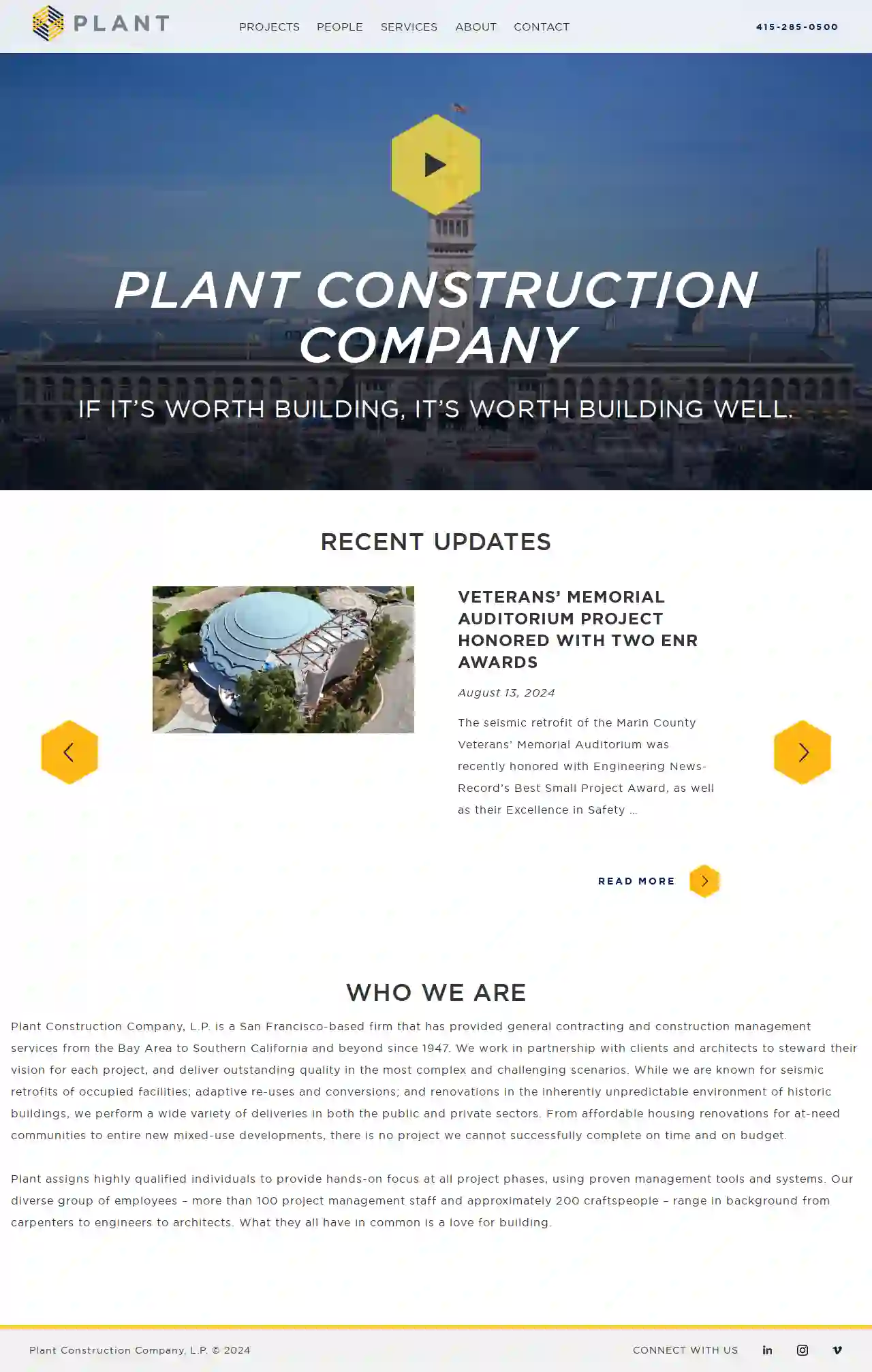
Plant Construction Company, L.P.
4.98 reviewsBrentwood, USPlant Construction Company, L.P. is a San Francisco-based firm that has provided general contracting and construction management services from the Bay Area to Southern California and beyond since 1947. We work in partnership with clients and architects to steward their vision for each project, and deliver outstanding quality in the most complex and challenging scenarios. While we are known for seismic retrofits of occupied facilities; adaptive re-uses and conversions; and renovations in the inherently unpredictable environment of historic buildings, we perform a wide variety of deliveries in both the public and private sectors. From affordable housing renovations for at-need communities to entire new mixed-use developments, there is no project we cannot successfully complete on time and on budget. Plant assigns highly qualified individuals to provide hands-on focus at all project phases, using proven management tools and systems. Our diverse group of employees – more than 100 project management staff and approximately 200 craftspeople – range in background from carpenters to engineers to architects. What they all have in common is a love for building.
- Services
- Why Us?
- Gallery
Get Quote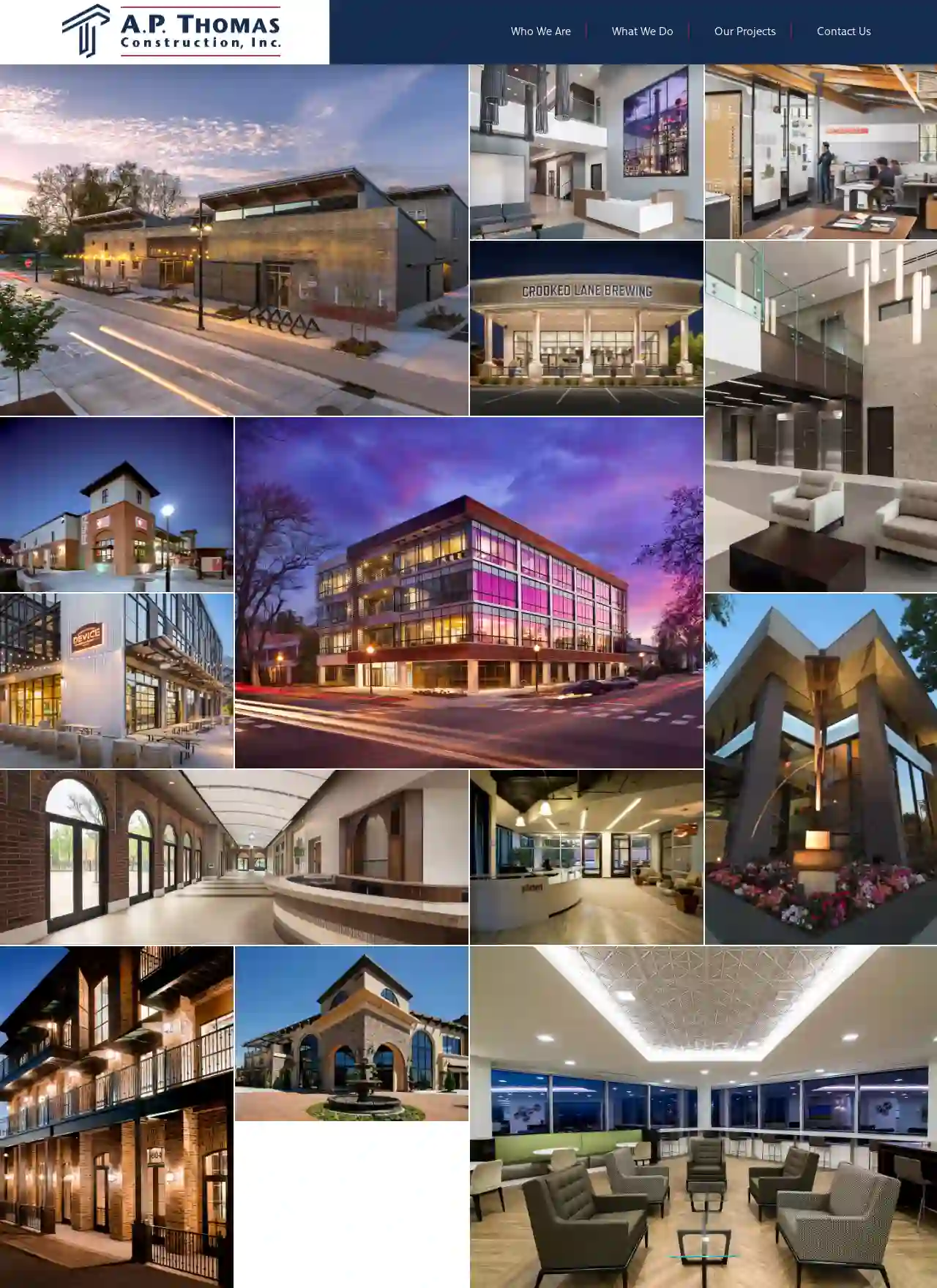
A.P. Thomas Construction, Inc.
52 reviews2330 Butano Drive, Sacramento, 95825, USIt’s a Great Day to Build! With A.P. Thomas Construction, Inc., an award-winning company based in the Sacramento area, you’ll recognize a company that rivals larger firms in capabilities and value, yet gives personal attention and commitment to you and your investment. For more than two decades, we’ve delivered innovation, diversity and quality to commercial projects throughout Northern California.
- Services
- Why Us?
- Gallery
Get Quote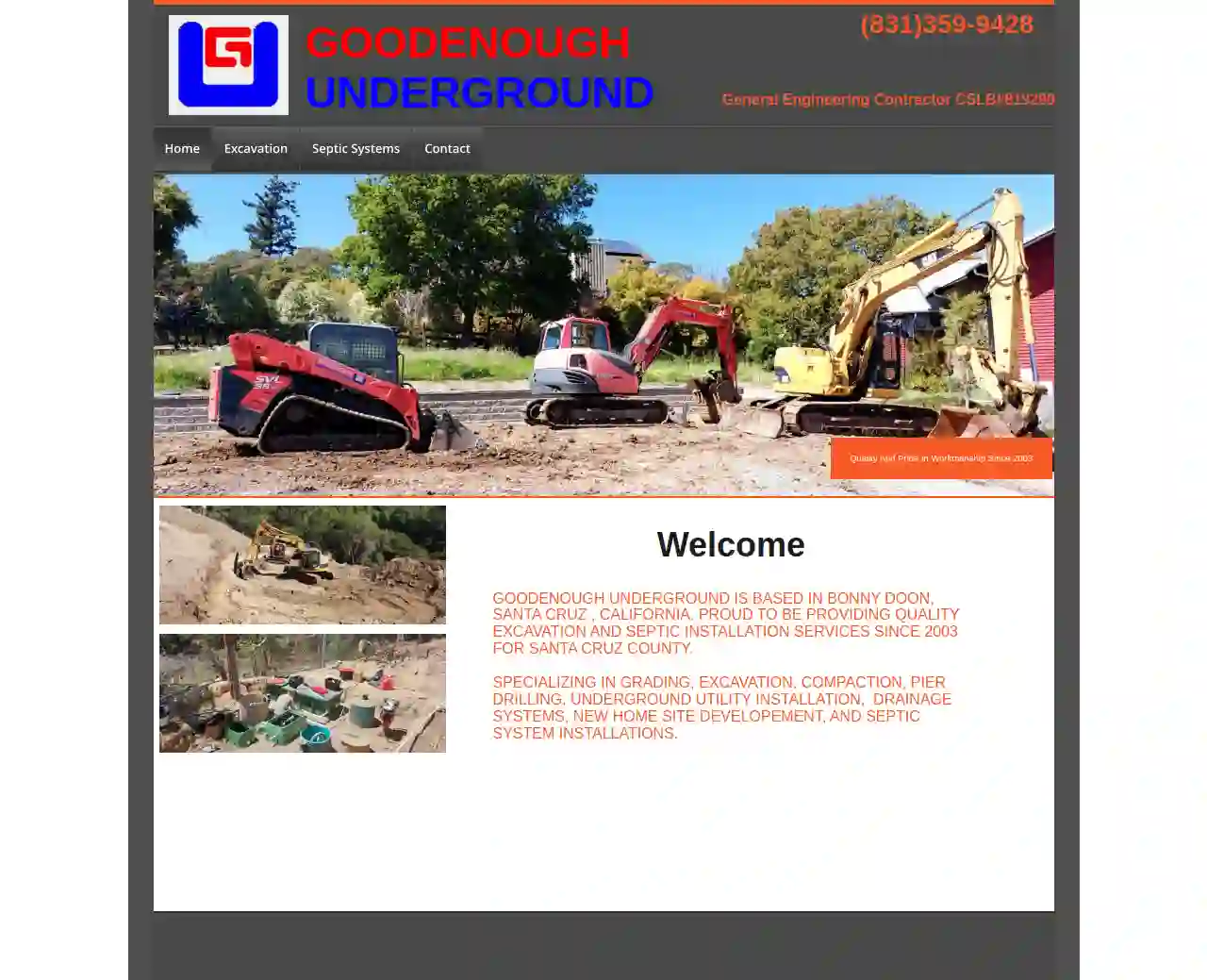
GOODENOUGH UNDERGROUND INC.
57 reviewsBonny Doon, USGOODENOUGH UNDERGROUND IS BASED IN BONNY DOON, SANTA CRUZ , CALIFORNIA. PROUD TO BE PROVIDING QUALITY EXCAVATION AND SEPTIC INSTALLATION SERVICES SINCE 2003 FOR SANTA CRUZ COUNTY. SPECIALIZING IN GRADING, EXCAVATION, COMPACTION, PIER DRILLING, UNDERGROUND UTILITY INSTALLATION, DRAINAGE SYSTEMS, NEW HOME SITE DEVELOPEMENT, AND SEPTIC SYSTEM INSTALLATIONS.
- Services
- Why Us?
- Our Team
- Gallery
Get Quote
Ground Breakers Construction
51 reviews2292 HAYRIDE ROAD, LEBEC, 93234, USCIVIL CONSTRUCTION COMPLETE SITE DEVELOPMENT & CONSTRUCTION SERVICES Ground Breakers Construction has over 25 years of experience in heavy civil construction specializing in mass earthwork, site improvements, road construction, and underground utilities. CIVIL CONSTRUCTION CONTRACTOR Ground Breakers Construction is a full-service site development and excavation contractor specializing in a broad range of site demolition, underground utility, and grading services for both public and private clients in the Southern and Central California and Western Colorado markets. We work directly for clients as a Prime Contractor as well for General Contractors or Construction Managers as a Sub-Contractor. MORE ABOUT GROUND BREAKERS Ground Breakers Construction is a full-service site development and excavation contractor specializing in a broad range of site demolition, underground utility, and grading services for both public and private clients in the Southern and Central California and Western Colorado markets. We work directly for clients as a Prime Contractor as well for General Contractors or Construction Managers as a Sub-Contractor. PARTNERING WITH THE INDUSTRY'S BEST We partner with clients to ensure every aspect of their project is planned appropriately, which streamlines the process saving time and resources. TRUSTED & RELIABLE TEAM The most important aspect of our business is our relationship with clients. We have the experience and dedication that ensures every job exceeds expectations. OUR EQUIPMENT We have invested in a wide range of reliable equipment making us a one-stop-shop for many clients. Our fleet of equipment also enables us to provide a larger and more cost-effective solution than our competitors. Ground Breakers Heavy Construction Services We offer a wide range of heavy construction services. Whether your project is large or small, we have the experience, capability, staff, and equipment needed to provide superior results. SERVICES Our business focuses on creating partnerships. You can depend on us to provide a dedicated team that isn’t satisfied until you’re satisfied.
- Services
- Why Us?
- Accreditations
- Gallery
Get Quote
Niehaus Earthmoving LLC
51 reviewsOakland, USOur Company At Niehaus Earthmoving LLC, our mission is to provide top-quality earthwork services that exceed our clients' expectations. We strive to deliver projects on time, within budget, and to the highest standards of safety and quality. Our Experience With over 15 years of experience in the mass-excavation and grading industry, our team has the skills and expertise to handle any job, no matter how complex. We've worked on projects start to finish ranging from city streets to large-scale commercial developments, Ag production facilities, wind/solar farms, landfills, wetland restorations, river diversions, waste management lagoons, heavy highway and interstate construction. Our Services We offer a comprehensive range of earthwork and demolition services including site preparation, excavation, grading, and compaction. We also provide dust control, erosion control, and slope stabilization measures to ensure the longevity of your project. " We Move The Earth " Initiation - Planning - Execution We are able to provide efficient and cost-effective grading services to ensure your project is completed on time, on budget and to your satisfaction. We provide expertise in, in-house site design such as building sites, drainage, and roads. We can meet any vigorous project scheduling demands. Contact us today to discuss your project needs and receive an estimate.
- Services
- Why Us?
- Our Team
- Gallery
Get Quote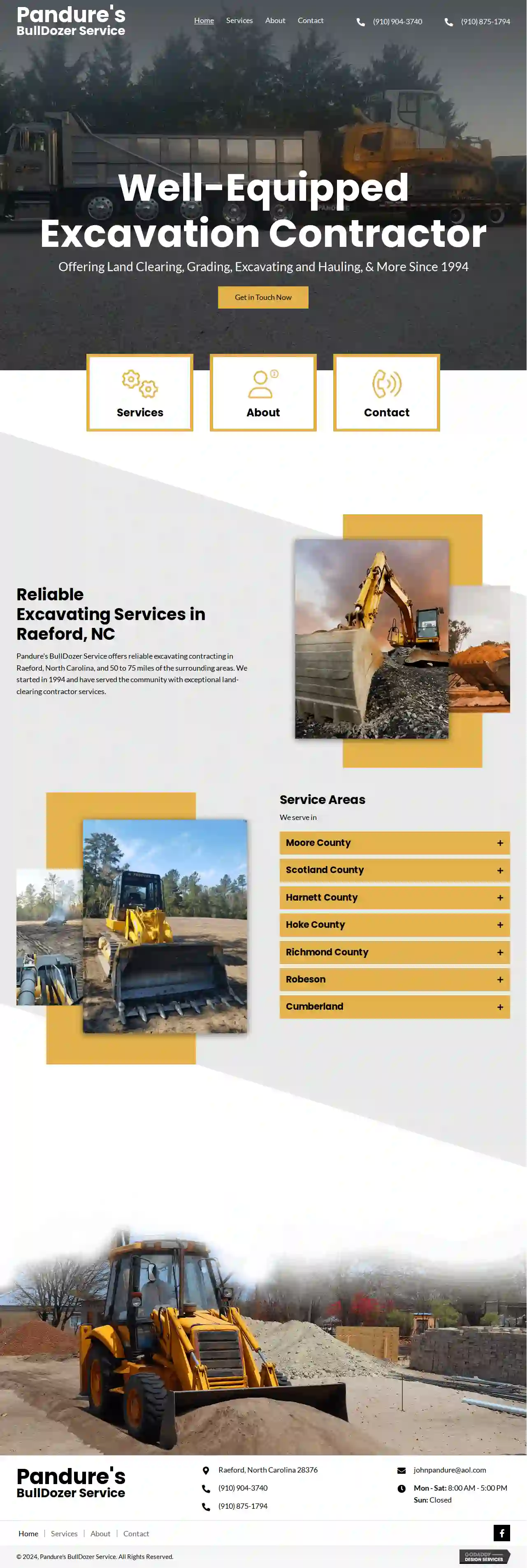
Pandure's BullDozer Service
58 reviewsRaeford, 28376, USPandure's BullDozer Service: Your Trusted Excavation Partner Pandure's BullDozer Service is a family-owned and operated excavation and land clearing specialist based in Raeford, North Carolina. We've been serving the community since 1994, providing reliable and professional services for all your land clearing, grading, excavating, and hauling needs. Our team is comprised of skilled professionals with decades of experience in the industry. We are committed to delivering seamless, safe, and trustworthy services, always prioritizing transparency and working within your budget. Whether you need land leveling for a new construction project, demolition work to clear an existing structure, or expert grading and excavating services, we have the expertise and equipment to handle it all. We are proud to serve a wide range of clients, including builders, developers, and homeowners in Raeford and the surrounding areas. At Pandure's BullDozer Service, we are dedicated to providing exceptional customer service and exceeding your expectations. Contact us today to discuss your project and let us help you bring your vision to life.
- Services
- Why Us?
- Testimonials
- Gallery
Get Quote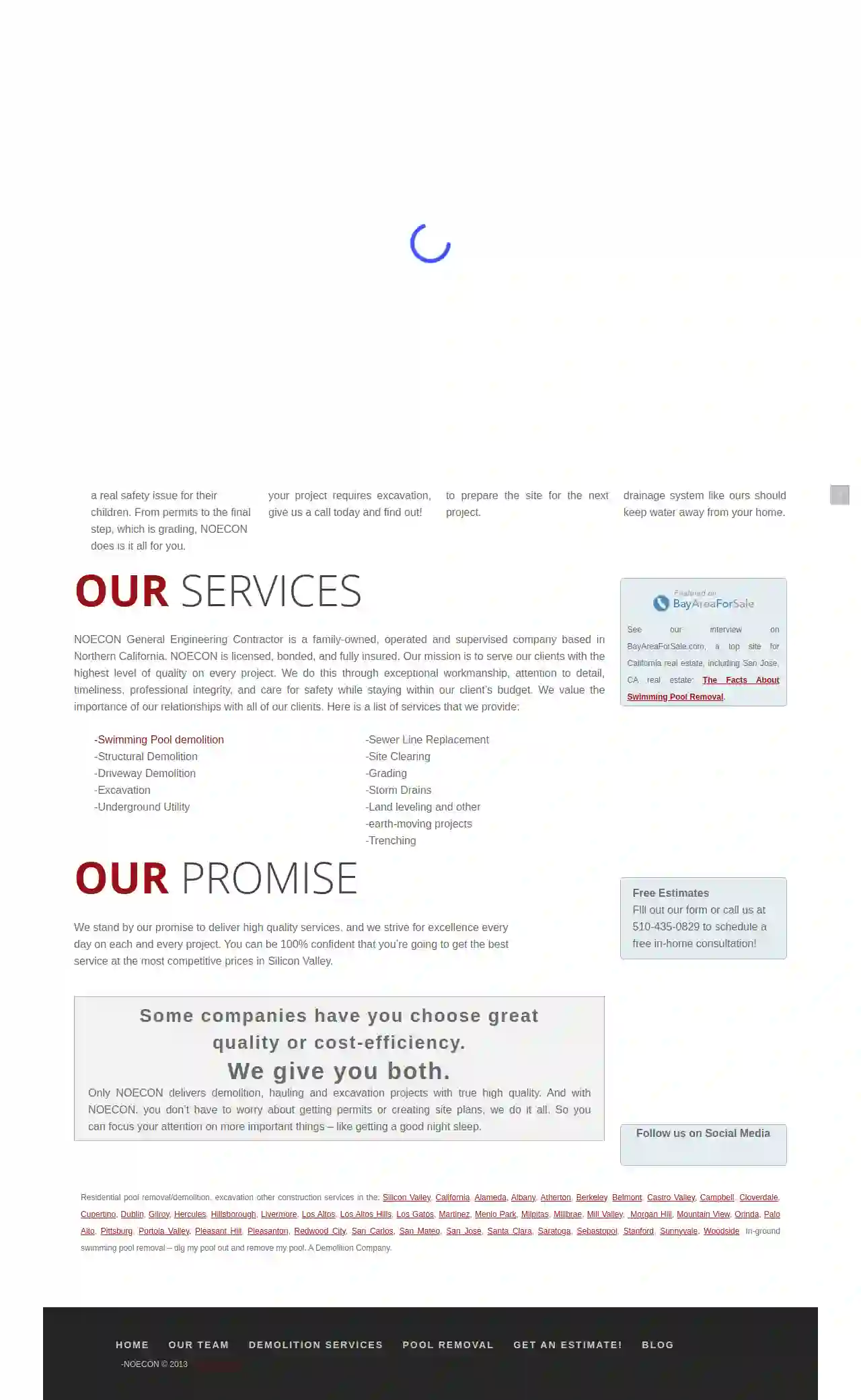
Noecon
53 reviewsSan Jose, USNOECON General Engineering Contractor NOECON is a family-owned, operated and supervised company based in Northern California. We are licensed, bonded, and fully insured. Our mission is to serve our clients with the highest level of quality on every project. We do this through exceptional workmanship, attention to detail, timeliness, professional integrity, and care for safety while staying within our client’s budget. We value the importance of our relationships with all of our clients. Our Promise We stand by our promise to deliver high quality services, and we strive for excellence every day on each and every project. You can be 100% confident that you’re going to get the best service at the most competitive prices in Silicon Valley. Some companies have you choose great quality or cost-efficiency. We give you both. Only NOECON delivers demolition, hauling and excavation projects with true high quality. And with NOECON, you don’t have to worry about getting permits or creating site plans, we do it all. So you can focus your attention on more important things – like getting a good night sleep.
- Services
- Why Us?
- Gallery
Get Quote
Suburban Plumbing
515 reviews14933 Adams Street, Midway City, 92655, USResidential & Commercial Plumbing We specialize in providing the highest quality residential and commercial plumbing services to Huntington Beach, Long Beach, Brea, Orange, Anaheim, Tustin, Santa Ana, Westminster, and all of Orange County, California. Sewer Line & Drain Cleaning Services When you ignore a clogged drain or ‘just live with it’ you could be setting yourself up for a far more expensive plumbing repair in the future. Call Suburban Plumbing Orange County right away at the first sign of a clog. Slab Leak Detection & Repair Services Have a suspiciously high water bill, or unexplained crack in your home foundation? Call Suburban Plumbing right away, early detection is pivotal in finding a slab leak and making repairs before significant damage can occur.
- Services
- Why Us?
- Our Team
- Testimonials
- Gallery
Get Quote
Over 22,076+ Excavation Contractors onboarded
Our excavation contractors operate in Spring Valley Lake and surroundings!
ExcavationHQ has curated and vetted the Best Excavation Contractors in Spring Valley Lake. Find a top & trustworthy contractor today.
Frequently Asked Questions About Demolition Contractors
- Dust Suppression: Use water spraying, misting systems, or other dust suppression techniques to control airborne particles.
- Noise Barriers: Erect temporary noise barriers around the demolition site to reduce noise transmission to nearby properties.
- Work Schedule: Schedule noisy demolition activities during permitted hours to minimize disturbance to neighbors.
- Communication: Keep neighbors informed about the demolition schedule and any potential disruptions.
- Enclosure: Sealing off the asbestos-containing material to prevent fiber release.
- Encapsulation: Coating the asbestos-containing material with a sealant to bind the fibers.
- Removal: Carefully removing the asbestos-containing material and disposing of it safely.
How can I minimize the dust and noise from demolition?
What is a demolition bond?
What are the different methods of asbestos abatement?
How do I find demolition contractors near me?
How can I minimize the dust and noise from demolition?
- Dust Suppression: Use water spraying, misting systems, or other dust suppression techniques to control airborne particles.
- Noise Barriers: Erect temporary noise barriers around the demolition site to reduce noise transmission to nearby properties.
- Work Schedule: Schedule noisy demolition activities during permitted hours to minimize disturbance to neighbors.
- Communication: Keep neighbors informed about the demolition schedule and any potential disruptions.
What is a demolition bond?
What are the different methods of asbestos abatement?
- Enclosure: Sealing off the asbestos-containing material to prevent fiber release.
- Encapsulation: Coating the asbestos-containing material with a sealant to bind the fibers.
- Removal: Carefully removing the asbestos-containing material and disposing of it safely.